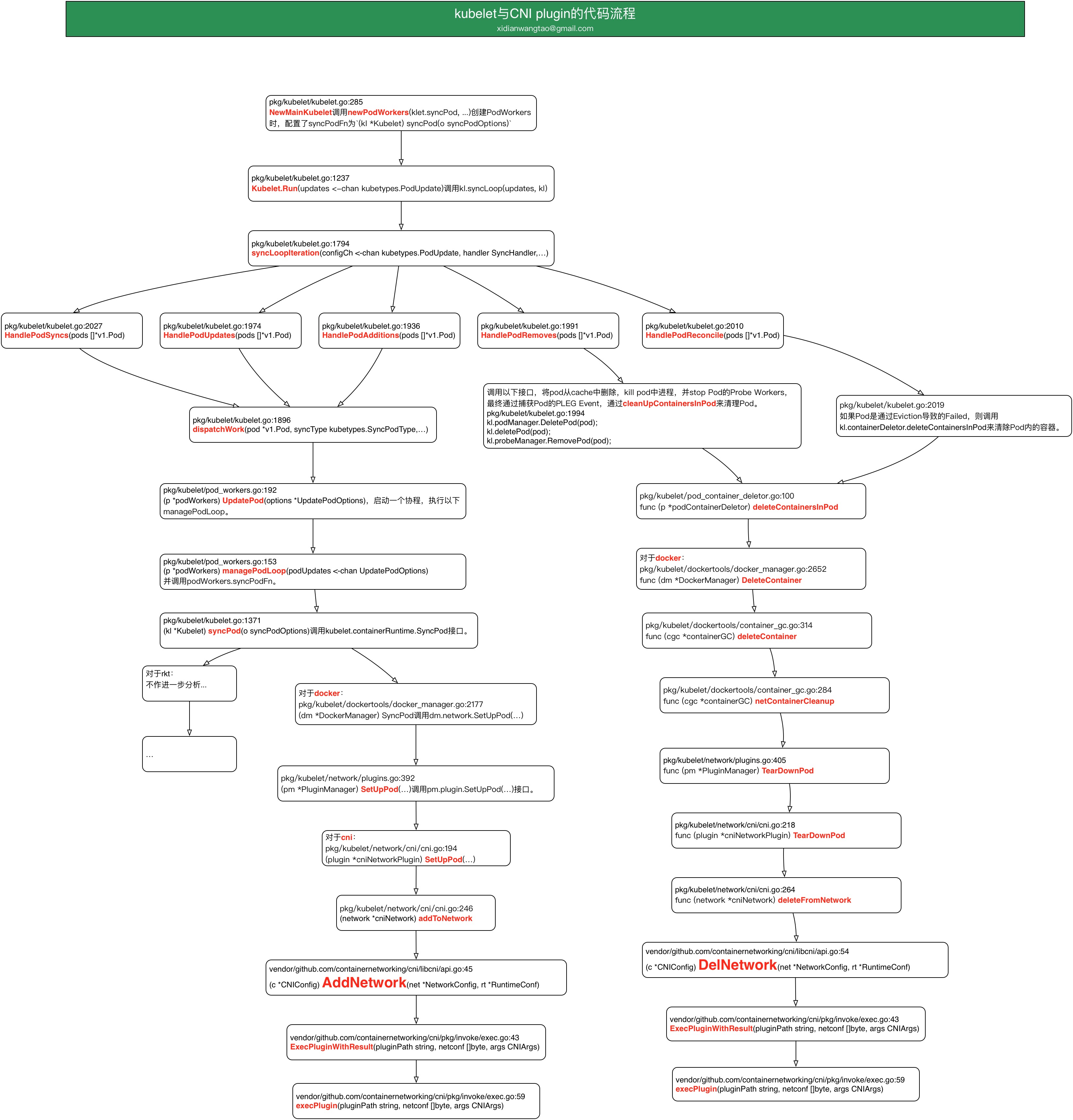更多关于kubernetes的深入文章,请看我csdn或者oschina的博客主页。
libcni
cni项目提供了golang写的一个library,定义了集成cni插件的应用需调用的cni plugin接口,它就是libcni。其对应的Interface定义如下:
libcni/api.go:51
type CNI interface {
AddNetworkList(net *NetworkConfigList, rt *RuntimeConf) (types.Result, error)
DelNetworkList(net *NetworkConfigList, rt *RuntimeConf) error
AddNetwork(net *NetworkConfig, rt *RuntimeConf) (types.Result, error)
DelNetwork(net *NetworkConfig, rt *RuntimeConf) error
}
CNI Plugin在kubelet管理的PLEG中何时被调用
kubelet Run方法方法中会最终调用syncLoopIteration函数,由它通过各种channel对pod进行sync。
pkg/kubelet/kubelet.go:1794
// syncLoopIteration reads from various channels and dispatches pods to the
// given handler.
//
// Arguments:
// 1. configCh: a channel to read config events from
// 2. handler: the SyncHandler to dispatch pods to
// 3. syncCh: a channel to read periodic sync events from
// 4. houseKeepingCh: a channel to read housekeeping events from
// 5. plegCh: a channel to read PLEG updates from
//
// Events are also read from the kubelet liveness manager's update channel.
//
// The workflow is to read from one of the channels, handle that event, and
// update the timestamp in the sync loop monitor.
//
// Here is an appropriate place to note that despite the syntactical
// similarity to the switch statement, the case statements in a select are
// evaluated in a pseudorandom order if there are multiple channels ready to
// read from when the select is evaluated. In other words, case statements
// are evaluated in random order, and you can not assume that the case
// statements evaluate in order if multiple channels have events.
//
// With that in mind, in truly no particular order, the different channels
// are handled as follows:
//
// * configCh: dispatch the pods for the config change to the appropriate
// handler callback for the event type
// * plegCh: update the runtime cache; sync pod
// * syncCh: sync all pods waiting for sync
// * houseKeepingCh: trigger cleanup of pods
// * liveness manager: sync pods that have failed or in which one or more
// containers have failed liveness checks
func (kl *Kubelet) syncLoopIteration(configCh <-chan kubetypes.PodUpdate, handler SyncHandler,
syncCh <-chan time.Time, housekeepingCh <-chan time.Time, plegCh <-chan *pleg.PodLifecycleEvent) bool {
kl.syncLoopMonitor.Store(kl.clock.Now())
select {
case u, open := <-configCh:
// Update from a config source; dispatch it to the right handler
// callback.
if !open {
glog.Errorf("Update channel is closed. Exiting the sync loop.")
return false
}
switch u.Op {
case kubetypes.ADD:
glog.V(2).Infof("SyncLoop (ADD, %q): %q", u.Source, format.Pods(u.Pods))
// After restarting, kubelet will get all existing pods through
// ADD as if they are new pods. These pods will then go through the
// admission process and *may* be rejected. This can be resolved
// once we have checkpointing.
handler.HandlePodAdditions(u.Pods)
case kubetypes.UPDATE:
glog.V(2).Infof("SyncLoop (UPDATE, %q): %q", u.Source, format.PodsWithDeletiontimestamps(u.Pods))
handler.HandlePodUpdates(u.Pods)
case kubetypes.REMOVE:
glog.V(2).Infof("SyncLoop (REMOVE, %q): %q", u.Source, format.Pods(u.Pods))
handler.HandlePodRemoves(u.Pods)
case kubetypes.RECONCILE:
glog.V(4).Infof("SyncLoop (RECONCILE, %q): %q", u.Source, format.Pods(u.Pods))
handler.HandlePodReconcile(u.Pods)
case kubetypes.DELETE:
glog.V(2).Infof("SyncLoop (DELETE, %q): %q", u.Source, format.Pods(u.Pods))
// DELETE is treated as a UPDATE because of graceful deletion.
handler.HandlePodUpdates(u.Pods)
case kubetypes.SET:
// TODO: Do we want to support this?
glog.Errorf("Kubelet does not support snapshot update")
}
// Mark the source ready after receiving at least one update from the
// source. Once all the sources are marked ready, various cleanup
// routines will start reclaiming resources. It is important that this
// takes place only after kubelet calls the update handler to process
// the update to ensure the internal pod cache is up-to-date.
kl.sourcesReady.AddSource(u.Source)
case e := <-plegCh:
if isSyncPodWorthy(e) {
// PLEG event for a pod; sync it.
if pod, ok := kl.podManager.GetPodByUID(e.ID); ok {
glog.V(2).Infof("SyncLoop (PLEG): %q, event: %#v", format.Pod(pod), e)
handler.HandlePodSyncs([]*v1.Pod{pod})
} else {
// If the pod no longer exists, ignore the event.
glog.V(4).Infof("SyncLoop (PLEG): ignore irrelevant event: %#v", e)
}
}
if e.Type == pleg.ContainerDied {
if containerID, ok := e.Data.(string); ok {
kl.cleanUpContainersInPod(e.ID, containerID)
}
}
case <-syncCh:
// Sync pods waiting for sync
podsToSync := kl.getPodsToSync()
if len(podsToSync) == 0 {
break
}
glog.V(4).Infof("SyncLoop (SYNC): %d pods; %s", len(podsToSync), format.Pods(podsToSync))
kl.HandlePodSyncs(podsToSync)
case update := <-kl.livenessManager.Updates():
if update.Result == proberesults.Failure {
// The liveness manager detected a failure; sync the pod.
// We should not use the pod from livenessManager, because it is never updated after
// initialization.
pod, ok := kl.podManager.GetPodByUID(update.PodUID)
if !ok {
// If the pod no longer exists, ignore the update.
glog.V(4).Infof("SyncLoop (container unhealthy): ignore irrelevant update: %#v", update)
break
}
glog.V(1).Infof("SyncLoop (container unhealthy): %q", format.Pod(pod))
handler.HandlePodSyncs([]*v1.Pod{pod})
}
case <-housekeepingCh:
if !kl.sourcesReady.AllReady() {
// If the sources aren't ready or volume manager has not yet synced the states,
// skip housekeeping, as we may accidentally delete pods from unready sources.
glog.V(4).Infof("SyncLoop (housekeeping, skipped): sources aren't ready yet.")
} else {
glog.V(4).Infof("SyncLoop (housekeeping)")
if err := handler.HandlePodCleanups(); err != nil {
glog.Errorf("Failed cleaning pods: %v", err)
}
}
}
kl.syncLoopMonitor.Store(kl.clock.Now())
return true
}
说明:
- HandlePodSyncs, HandlePodUpdates, HandlePodAdditions最终都是invoke dispatchWork来分发pods到podWorker进行异步的pod sync。
- HandlePodRemoves调用一下接口,将pod从cache中删除,kill pod中进程,并 stop Pod的Probe Workers,最终通过捕获Pod的PLEG Event,通过cleanUpContainersInPod来清理Pod。 pkg/kubelet/kubelet.go:1994 kl.podManager.DeletePod(pod); kl.deletePod(pod); kl.probeManager.RemovePod(pod);
- HandlePodReconcile中,如果Pod是通过Eviction导致的Failed,则调用kl.containerDeletor.deleteContainersInPod来清除Pod内的容器。
HandlePodSyncs, HandlePodUpdates, HandlePodAdditions
- Kubelet.dispatchWork最终会invoke podWokers.managePodLoop,podWorkers会嗲用NewMainKubelet时给PodWorkers注册的syncPodFn= (kl *Kubelet) syncPod(o syncPodOptions)。
- Kubelet.syncPod会根据runtime类型进行区分,我们只看runtime为docker的情况,会invoke DockerManager.SyncPod。
- DockerManager.SyncPod会dm.network.SetUpPod,然后根据network plugin类型进行区分,我们只看cni plugin,会对应invoke cniNetworkPlugin.SetUpPod进行网络设置。
- cniNetworkPlugin.SetUpPod invoke cniNetwork.addToNetwork,由后者最终调用CNIConfig.AddNetwork,这就是libcni中对应的AddNetwork Interface。
- CNIConfig.AddNetwork通过封装好的execPlugin由系统去调用cni plugin bin,到此就完成了pod内的网络设置。
HandlePodRemoves, HandlePodReconcile
- 都是通过invoke podContainerDeleter.deleteContainerInPod来清理容器。
- 对于docker,deleteContainerInPod会调用DockerManager.delteContainer。
- 在deleteContainer时,通过invoke containerGC.netContainerCleanup进行容器的网络环境清理。
- 然后由PluginManger.TearDownPod去调用cniNetworkPlugin.TearDownPod,再执行cniNetwork.deleteFromNetwork。
- cniNetwork.deleteFromNetwork会调用CNIConfig.DelNetwork,这就是libcni中对应的DelNetwork Interface。
- CNIConfig.AddNetwork通过封装好的execPlugin由系统去调用cni plugin bin,到此就完成了pod内的网络清理。
kubelet中与cni plugin调用的代码流程图

更多关于kubernetes的深入文章,请看我csdn或者oschina的博客主页。























 被折叠的 条评论
为什么被折叠?
被折叠的 条评论
为什么被折叠?








